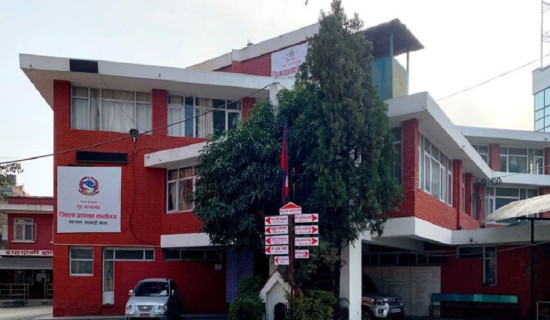- Monday, 2 March 2026
Poet and song writer Gokul Joshi to be remembered
By Phadindra Adhikari,Lekhnath, May 21: ‘Rokne Ko ho Durdarshi Bicharka Dhara (Who can stop the flow of visionary ideas)? Ko Ho Naya Nepalko Bokne Abhibhara ? (Who is responsible for carrying the new Nepal)?
Poet and progressive songwriter Gokul Joshi used to challenge the opponents of change in his poems and motivate people to change.
The poems he wrote about seven decades ago are still relevant today. The entire life of the poet, who wrote poems about the poor, hungry, and oppressed, was like that of a low-level labourer.
Born in Shuklagandaki-11, Raipur of Tanahun on May 21, 1930, Joshi died at the age of 31 in 1961.
He had published six small works of poetry and some small compositions.
On his birth anniversary, Tanahun Samparka Samaj Pokhara, Gandaki Sahitya Sangam Pokhara is remembering the poet on Tuesday.
The Sangam has established the Gokul Wangmaya Award in Joshi’s honour and has been distributing it every two years.
In his name, Gokul Park has been built in Kholakhet, Raipur, Shuklagandaki Municipality of Tanahun, his birthplace. There is also a plan to turn Joshi’s birthplace into a museum, said Stragan Rana, a writer who lives in Kholakheti.
Some of Joshi’s poems are now included in the syllabus while the book ‘Gokul Joshi Ka Sankalita Rachanaharu’ has been published, including all his available works.
About Joshi, Dr. Taranath Sharma has written, “The harsh times made poet Joshi mad and the ruthless times took him away.”
Active in the movement for about 10 years since 2009 BS, he died of malaria and pneumonia in Ghailadubba, Jhapa, in 2018 BS.
According to studies about Joshi, he lost his father when he was six years old. He went to Lahore, India, at the age of 13 to help his mother who was raising seven children and to improve financially. After returning to Nepal after the revolution of 2007, he worked in many different places.
Joshi, who acquired knowledge through self-study, used to travel and write in various parts of Nepal including Silang, Kolakata, Madras and Mumbai.
Dr. Krishnaraj Adhikari, a professor at Nepal Pragya Pratishthan, said that Joshi suffered all his life due to a lack of family life, being unmarried, and his wanderlust nature.
Joshi did not receive any awards or honours during his lifetime.















